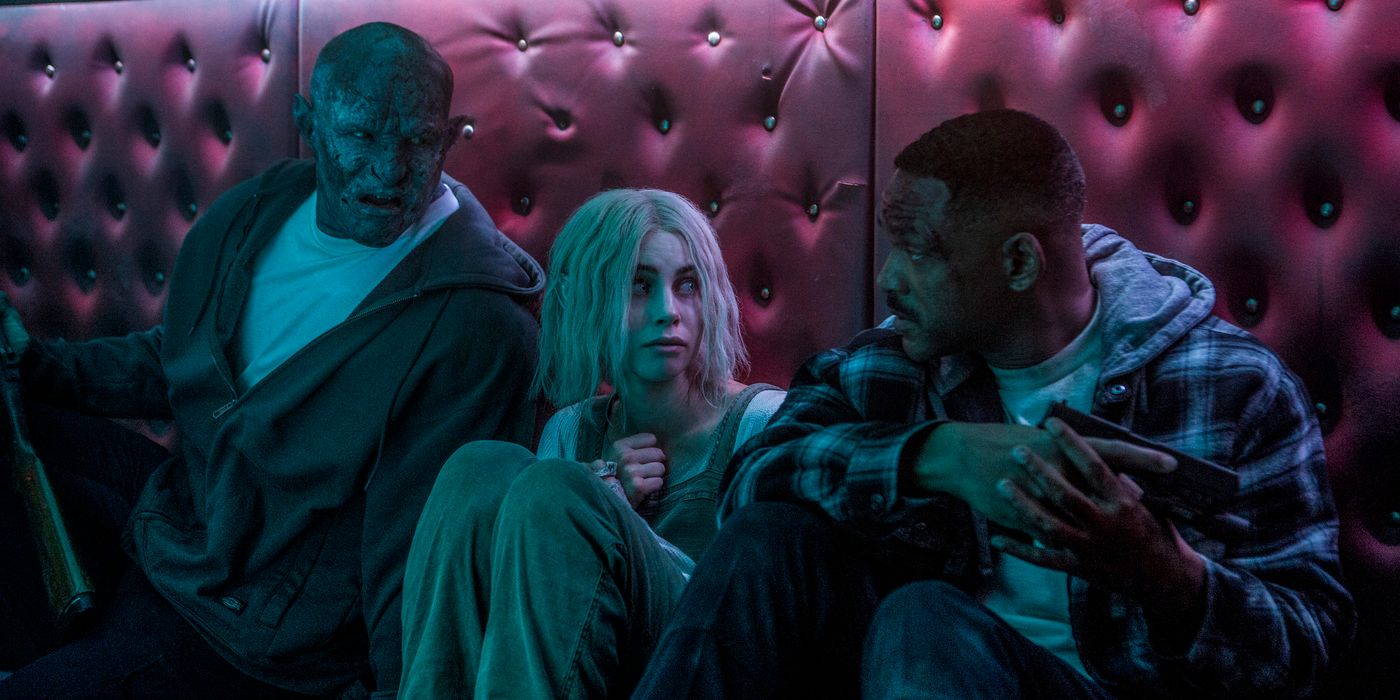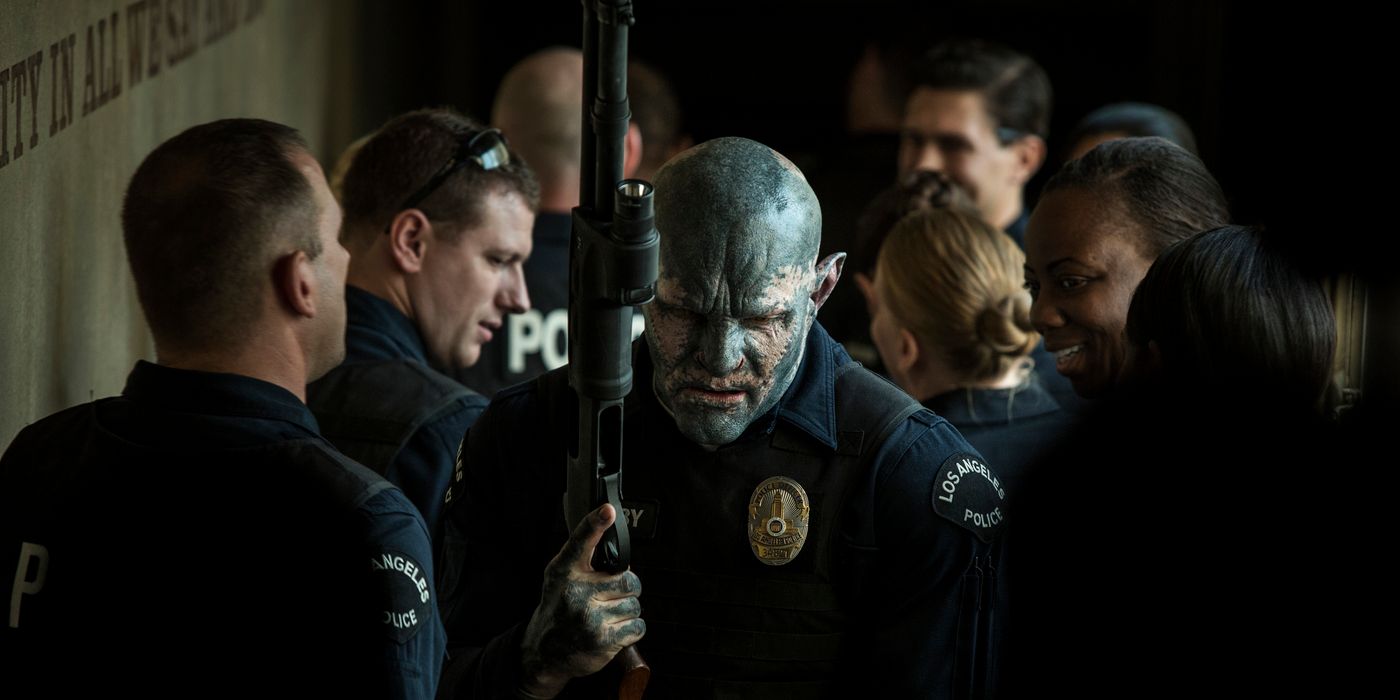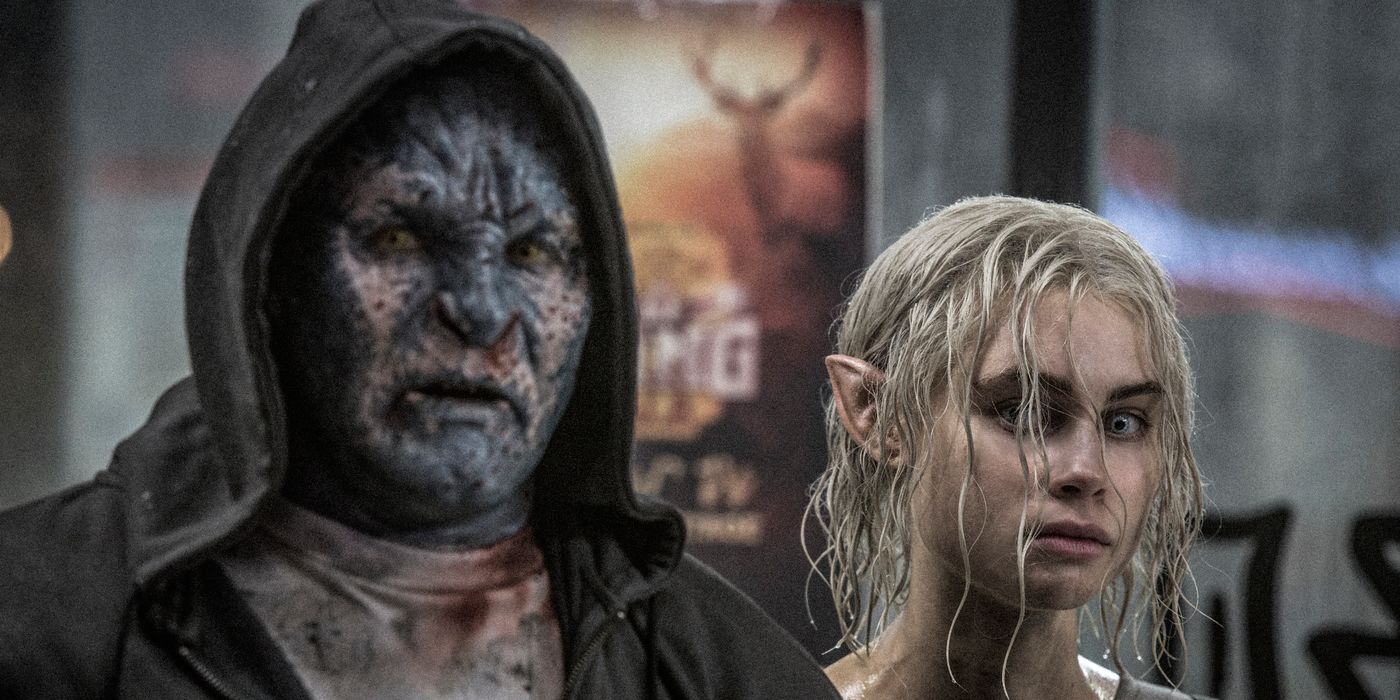Netflix’s Bright released today, but critics had ample time to ponder David Ayer and Max Landis’ modern-fantasy collaboration. Unfortunately for Ayer, who directed the film, and Landis, who wrote it, the movie is being raked over the coals right now. To give you an idea of the reception: Several reviewers have called Bright the worst film of the year, and one even likened it to the recently passed (and nightmarish) Republican tax bill. Yeah, that’s how much critics hate Bright -- it got political.
But that’s not really a surprise, since Bright itself gets political from the outset. Bright stars Will Smith as an L.A.P.D. cop named Ward who suddenly finds himself partnered with an orc named Jakoby, played by Joel Edgerton. Jakoby is the first of his kind to become a police officer, and his inclusion on the force rankles the human cops (and most of humanity) who still hold a centuries-old grudge against orcs for their role in an ancient, cataclysmic conflict. Jakoby endures all sorts of abuse and prejudice from his fellow human officers who don’t trust him and want nothing to do with him. The modern racial parallels are drawn immediately, but to little effect.
RELATED: Netflix Orders Sequel to Will Smith’s Bright, Renews Dark
The world of Bright is teeming with traditional fantasy creatures like orcs, elves, dragons and fairies, all of whom inhabit a familiar, modern setting. This world is divided into three hierarchical echelons, with the elves at the top, humans in the middle and orcs at the very bottom. If the metaphor isn’t clear enough yet, then it might help to know that the L.A.P.D. considers Jakoby a “diversity hire.” Like so much modern fantasy, the orcs are a stand-in for systemically oppressed minorities. There’s room in there for Bright to do some interesting work, especially in our polarizing times, but, you know… it doesn’t.
If there’s one moment that collectively got under reviewers’ skin, it’s the film’s opening, which sees Will Smith attacking a fairy for getting caught in his bird feeder. Smith pummels the fairy to death with a broom, shouting “fairy lives don’t matter today!” Bright is seemingly nothing if not tone-deaf, a complaint that also extends to its treatment of women. Bright’s story revolves around a missing elvish wand in the possession of Tikka (Lucy Fry), an elf who might be -- you guessed it -- the Chosen One. Fry isn’t given much to do in the film, and nor is Noomi Rapace’s Leilah, a dark elf in pursuit of the wand.
RELATED: New Bright Trailer Asks Why Orcs Always Have to Be the Bad Guys
The fact that Bright has been received so poorly by critics is likely a big blow to Netflix, which spent over $90 million on the movie -- their first blockbuster attempt. For a little context, James Mangold’s Logan was made on a $97 million budget, while Deadpool was produced for only $58 million. So, Netflix means business. But with reviews like this, it will be interesting to see how the streaming giant pivots. A sequel to Bright has already been greenlit, with the assumption that a spinoff series (Netflix loves to turn anything it can into a binge-worthy television show) isn’t far behind.
But who can say what the future holds. We’re in the present. So, let’s get down to what critics thought of Netflix’s Bright:
Bright simply lacks the screenwriting smarts to capitalize on the social commentary in its setup that it so nakedly attempts to harness. Though its universe has been thought through at least visually, the plot is all adrenaline and no insight. That’s become abundantly clear by the third act, teeming with 10-story explosions, brutal firefights, and the kind of ridiculous heroics one might expect from the star of Bad Boys. As action entertainment goes, you could do worse, but for a story trying to shine someplace new, Bright generally operates at little more than an enthusiastic flicker. – The Boston Globe
There’s boring, there’s bad, and then there’s Bright, a movie so profoundly awful that Republicans will probably try to pass it into law over Christmas break. – IndieWire
RELATED: Netflix Issues Statement on Net Neutrality Repeal
Kicking off with a montage featuring "Curse the Police" graffiti and murals of orcs with fists raised in the air, Bright wastes no time in setting up its magic + metaphor modus operandi and quickly pounding it in to the ground. Then, perhaps realizing that it has little to really say about racial relations or class divisions in America past "because, see, the orcs are like African-Americans in this scenario, you totally picked up on that, right?", the movie drops any attempt at using the conceit in the name of satire or incisiveness past an N.F.L. dig or two. (Can a metaphor be both overplayed and underdeveloped at the same time? Yes. Yes, it most certainly can be.) – Rolling Stone
Dungeons and Dragons–style fantasy, with its species-specific stats and attributes, is a pretty suspect well to draw from if you’re trying to pull off some kind of modern-day race relations metaphor. It’s most typically used as a kind of blurring device, a way to talk about inequality and injustice in a non-specific, inoffensive way, with the built-in disclaimer that it’s all pretend anyway. (Think of any Star Trek episode where the Enterprise encounters a planet embroiled in an interspecies conflict.) I’m not entirely sure what real counterpoint orcs and elves could contribute to the extremely real history of racially charged police violence in Los Angeles, besides the fact that it’s kind of cool in a three-bong-hits-in way. – Vulture
RELATED: She-Ra Reboot Headed to Netflix, with Showrunner Noelle Stevenson
At first glance, it seems admirable to tell a parable of sorts about modern day class structure using orcs as a stand-in for the downtrodden and discriminated against. You see exactly the points Landis is trying to make. But over the course of Bright’s runtime it becomes uncomfortably clear that by using orcs as a surrogate for oppressed minorities you end up erasing actual oppressed minorities from the story. It quickly transitions from “Oh, I see what you’re doing” to “Maybe you should not have done this.” -- Collider
In theory, a modern-day fantasy setting sounds like a perfect franchise starter, and with better execution, it could’ve made for a launchpad to all sorts of sequels and spinoffs. In reality, Ayer and Landis’s world is so dull and ill-conceived that few will want to spend any additional time there. It’s a world of magic that lacks any of its own. – Entertainment Weekly



